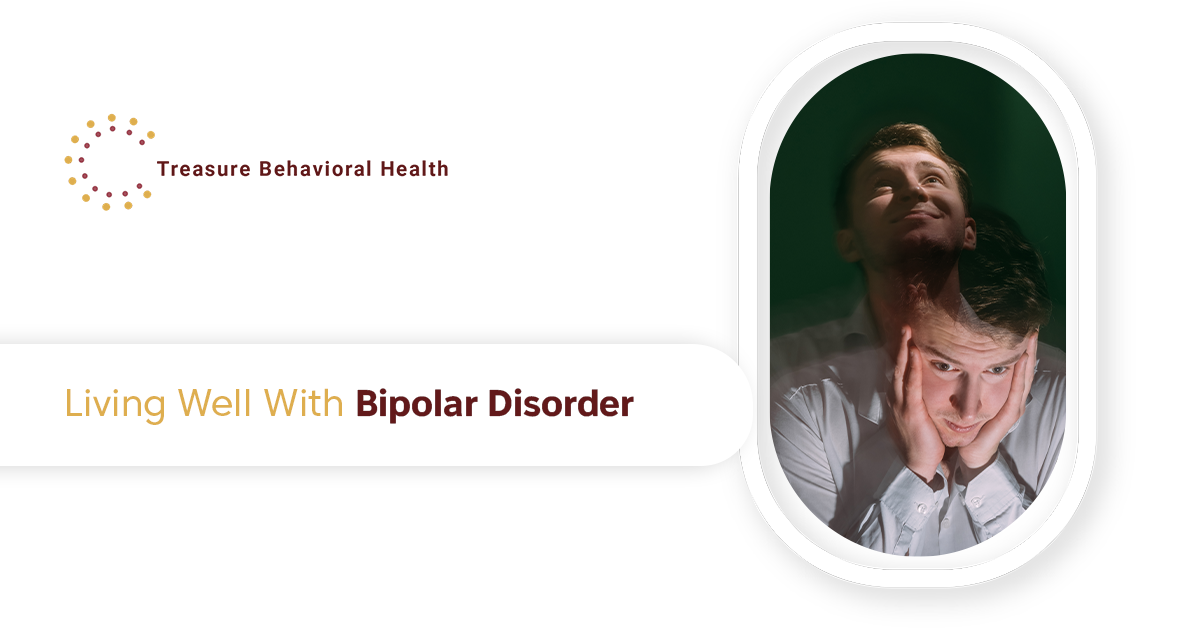Living with bipolar disorder is hard. Some days are worse than others. But you can manage it and build a life that works for you.
At Treasure Behavioral Health, we work with people who want effective methods. Here’s what actually helps.
Figure out your patterns
What triggers your episodes won’t be the same as someone else’s.
- Write down your moods for a month – don’t make it complicated
- Notice what happened before bad episodes
- Track your sleep because it affects everything
- Pay attention to stress and what kinds hit you hardest
- Watch the seasons – many people get worse in winter or spring
Get the right people around
You need people who understand. Not people who tell you to think positively.
- Find a therapist who knows bipolar disorder specifically
- Look for a mental health professional you can talk to honestly
- Tell your family what helps and what doesn’t
- Join a support group where you can say how you really feel
- Cut out people who just make you feel worse
- Do ask for help when you need it
Good support means people who show up when you’re struggling, not just when you’re doing well.
Lifestyle changes that help
These can make a difference.
- Sleep at regular times even when you don’t want to
- Take your meds at the same time every day
- Eat something even if you don’t feel like it
- Get outside for at least a few minutes
- Move your body however you can
- Have a routine that works for you
Small things done consistently beat big changes you can’t stick to.
Dealing with medication
If you take medication, make it work for you. Good medication management can make a lot of difference.
- Be honest with your doctor about side effects
- Don’t stop taking it without talking to them first
- Set up reminders so you don’t forget
- Give new meds time to work
- Track what helps and what makes you feel worse
- Know it’s not forever – you can adjust things
Your medication is a tool that helps your brain work better.
Crisis planning
You need a plan for when things get really bad.
- Write down warning signs that you’re heading toward an episode
- List people to call when you need help
- Know your triggers and how to avoid them
- Have coping strategies ready
- Keep important numbers somewhere easy to find
- Tell someone you trust about your plan
Planning does not imply that you anticipate the worst. It is being wise.
Creating a life worth living
Bipolar disorder does not need to control your life. And you can continue doing things that are important to you.
- Focus on today instead of worrying about forever
- Do things you enjoy when you feel up to it
- Set small goals you can actually reach
- Be creative in whatever way feels good
- Connect with people who care about you
- Give yourself credit for getting through hard days
You’re dealing with something difficult, and that takes strength.
Get Help from a Professional
If you’re tired of managing this all by yourself, we can help. At Treasure Behavioral Health, Dr. Roberta Iyamu DNP, APN, MSN, PMHNP-BC provides compassionate care for bipolar disorder.
She understands what bipolar disorder actually looks like, and knows what works.
Call Treasure Behavioral Health today.
FAQs
So, how do I tell whether I am experiencing an episode?
Observe sleep or energy changes, spending, or decision-making changes. Be alert when the people surrounding you are concerned.
Will I be able to lead a normal life?
It is possible to have relations, a career, and ambitions. It might look different from what really you expected, but it’s still yours.
What if nothing helps?
What is effective on another may not be effective on you, but there are alternatives.
Treasure Behavioral Health can provide you with all the support you need.


No comment